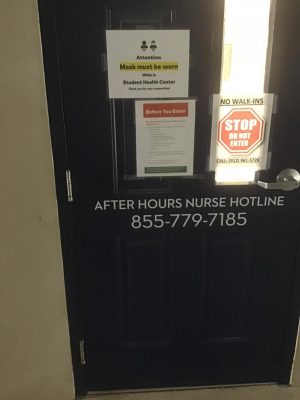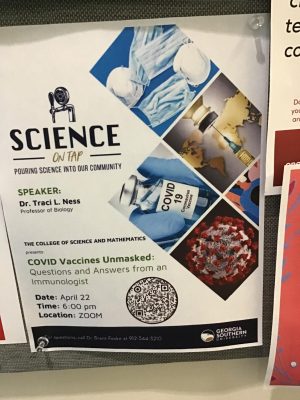COVID-19 Vaccine Virtual Town Hall
What Students Need to Know about the Moderna COVID-19 Vaccine: Additional Resources Linked Below
February 23, 2021
The Jiann-Ping Hsu College of Public Health hosted a COVID-19 Vaccine Virtual Town Hall on Wednesday, Feb 17.
Dr. Brian Deloach presented information on the vaccines and Georgia Southern’s plan for distribution for about a half an hour.
“The information provided in this presentation is the data that is current as of 6:02 p.m. on February 17th,” Deloach said at the beginning of the presentation.
For the remaining part of the hour, Dr. Gemma Skuraton, the director of Student Wellness and Health Promotion, moderated the Q&A portion of the event in which Deloach and associate professors, Dr. Jessica Schwind and Dr. Stacy Smallwood, answered questions from the participants.
The Food and Drug Administration (FDA) authorized two vaccines for Emergency Use Authorization (EUA) , the Moderna vaccine and the Pfizer vaccine. The studies performed showed that both the Pfizer and Moderna vaccines were over 94% effective at preventing symptomatic COVID-19.
Even though the vaccines were approved under EUA, they had to follow the same safety standards as other vaccines. The difference between EUA and traditional processes is that usually these new technologies have to get at the back of the queue.
“This got put at the front at the line at the top of the desk…Some other research got put on hold and those resources got put into this vaccine,” Deloach said.
Neither vaccine contains a live version of the COVID-19 virus, so recipients of the vaccine cannot get COVID-19 from the vaccine. Additionally, someone exposed to COVID-19 through the vaccine cannot transmit it to others.
Side effects as a result of the body’s immune response to the vaccine can include headache, fever with or without chills, body aches, fatigue, and redness and swelling at the injection site.
The COVID-19 vaccines are highly effective at preventing COVID-19, but they are not 100% effective.
While the side effects like the ones listed above are expected and normal after receiving the vaccination, other symptoms specifically, cough, runny nose, sore throat, and loss of sense of taste or smell are not expected side effects.
“Any person who experiences these symptoms after vaccination, regardless of how much time has passed after vaccination, should report those symptoms to their medical provider because there is still a possibility that they could have COVID illness,” Deloach said.
Georgia Southern chose the Moderna vaccine at its drive-thru clinics in Statesboro and Savannah because it does not require ultra cold storage, like the Pfizer vaccine, and Georgia Southern has more storage space that meets its storage requirements. Students should make sure they receive both doses of the same vaccine.
If students received their first dose from the university, they should receive a second dose of the vaccine, either from the university or another Moderna vaccine provider, whichever will provide the vaccine closer to the 28-day mark after the first dose.
Students should not receive the second dose sooner than 28 days after the first dose. Current research supports that the second dose is most effective between 28 and 42 days after the first dose. However, second doses that are given after the 42nd day are still considered valid, so it is not necessary to restart the process if someone is unable to get the second dose within that window.
Three main factors determine the pace at which Georgia Southern administers the vaccine to students. Vaccine distribution and storage requirements affect the roll out of vaccine distribution.
The second factor is the number of doses of vaccine the state allots to the university. Georgia Southern has requested 2400 vaccines and only received 300 in three 100-dose increments.
The point of the drive-thru is “so that we can administer a large number of vaccines in a short time-up to several hundred to a thousand vaccinations in a 6-8 hour period,” Deloach said. At press time, the university does not have the vaccinations to offer that many vaccines so the drive-thru stations are closed on both campuses.
Most importantly, Georgia Southern will lose its privilege to vaccinate students and faculty if it vaccinates anyone outside of the phase of vaccine administration that the state of Georgia is currently in.
At press time, Georgia is in phase 1A+, which includes health care workers, law enforcement, firefighters, and adults 65+ and their caregivers.
According to the CDC, “Caregivers provide care to people who need some degree of ongoing assistance with everyday tasks on a regular or daily basis. The recipients of care can live either in residential or institutional settings, range from children to older adults, and have chronic illnesses or disabling conditions.”
Students who meet the above criteria for a caregiver and would like to be notified when Georgia Southern receives vaccines they can distribute, please fill out this Google form. This link can also be found under the COVID-19 Information and Resources tab of a student’s MyGS portal.
“We will know more about who qualifies for vaccines under phase 1B when we get there,” Deloach said. When the state enters phase 1B, anyone in phase 1A+ can still get vaccinated if they have not already.
Receiving a vaccination at a Georgia Southern drive-thru clinic will consist of five stages:
- The greeter station where students check-in
- The screening station where students answer a questionnaire to determine if the recipient needs 15-minute or 30-minutes wait time after the vaccine, or has a medical history that would prevent them from receiving the vaccine, and sign consent forms
- The vaccination station where they get vaccinated and receive their vaccine card
- The observation area where the student will park and wait for the amount of time determined by the screening
- The exit station where the student will receive additional information before they leave
After students get the vaccine, it is still important they social distance, wear a mask, stay away from large crowds and wash their hands. The goal of the vaccine was to prevent symptomatic COVID-19, so there is still a chance of asymptomatic infection with the vaccine.
“We’re still learning a lot about how the vaccine prevents risk of infection. The mask prevents transmission but doesn’t provide immunity. You need the vaccine for that,” Schwind said.
Shelby also said that there is no way to tell who has and hasn’t had the vaccine and seeing large numbers of people not following the “do right” guidelines may lead more unvaccinated people to think those are guidelines they no longer need to follow.
Finally, Deloach told students that the purpose of the town hall was to not to convince students to get the vaccine but to give students all the necessary information to make an informed decision about whether to get the vaccine.
“No vaccine is perfect… Kinda like with the flu vaccine, the flu vaccine may not keep you from getting a mild cause of flu, but it will keep you out of the hospital,” Schwind said.
“I would really encourage you to talk to your healthcare provider if you do have any concerns,” Deloach said.
For more information about the COVID-19 vaccines and Georgia’s and Georgia Southern’s plan to administer the vaccine, visit the following resources provided by Dr. Deloach.
- Georgia Southern’s COVID-19 vaccine resource page: https://www.georgiasouthern.edu/covid-19-information/vaccine/.
- Georgia Department of Public Health COVID-19 vaccine page: https://dph.georgia.gov/covid-vaccine.
- CDC’s COVID-19 resource page: https://www.cdc.gov/coronavirus/2019-ncov/vaccines/index.html.
- Infectious Disease Society of America mRNA vaccine resource page: https://www.idsociety.org/covid-19-real-time-learning-network/vaccines/vaccines-information–faq/.
- For an excellent review from CDC of what to expect after getting a COVID-19 vaccine, see https://www.cdc.gov/coronavirus/2019-ncov/vaccines/expect/after.html
- For more information from CDC on flu vaccine efficacy, see https://www.cdc.gov/flu/vaccines-work/vaccineeffect.htm.
- For an excellent overview of the COVID-19 mRNA vaccines, see https://www.idsociety.org/covid-19-real-time-learning-network/vaccines/vaccines-information–faq/











